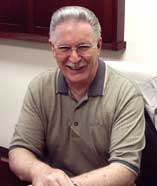AEROSPACE INDUSTRY REVIEW
Certification Pact
to Benefit Two Markets
to Benefit Two Markets

|
| John Riley, CEO, BC Manufacturing |
Meanwhile, a new development is unfolding south of the U.S.-Mexico border, primarily in Baja California, that could help or hinder the ability of North American aerospace clusters to grow, depending on one's perspective. Strict cross-border certification measures make it difficult for non-U.S. companies to supply aeronautics and aircraft-manufacturing components to U.S. buyers. But companies in Mexico seeking bi-national certification to supply aerospace components to U.S. manufacturers are making significant progress, which is paving the way for U.S. companies to purchase lower-cost components and therefore compete more aggressively on cost.
The signing of the Bilateral Aviation Safety Agreement (BASA) by U.S. and Mexican officials in February 2004 is largely behind this development. Ten years in the making, the U.S.-Mexico BASA pact ensures that certified Mexican companies can now market components directly to North American purchasers. Till then, only Germany and Canada had BASA pacts with the United States.
At the front of the certification line in Mexico is BC Manufacturing (BCM), a Mexican subsidiary of San Diego-based Vertek, which provides manufacturing services in the San Diego and Tijuana, Mexico, area to electronics, medical device and automotive manufacturers. A current client is a semiconductor-equipment handling company that is establishing manufacturing capabilities in a BCM site. Aerospace is BC Manufacturing's newest area of expertise. Vertek establishes strategic manufacturing units, or shelters, in the region that are in essence offshoots of the traditional maquiladora. BC Manufacturing CEO John Riley is a 20-year veteran of the maquiladora scene in Tijuana and southern California.
"We are focusing on emerging or developing technologies, such as composites, which we can build on with the experience we have from a manufacturing standpoint," says Riley. BC Manufacturing is 100-percent Mexican owned, which provides certain incentives or benefits, he points out. "For example, to go after the high-tech market, we do not have to comply with an asset tax on materials and equipment coming into Mexico. We pay taxes based on our own profit and loss like any U.S. company would here. In Mexico," Riley continues, "if you aren't under something like this structure, and are a Mexican company or a traditional maquiladora, then you are subject to paying taxes on the value of the capital equipment. If you're going to be in aerospace, the value of the capital equipment is very high, and this is a tremendous fiscal benefit. Our focus is on high-tech, highly capital-intensive work."

